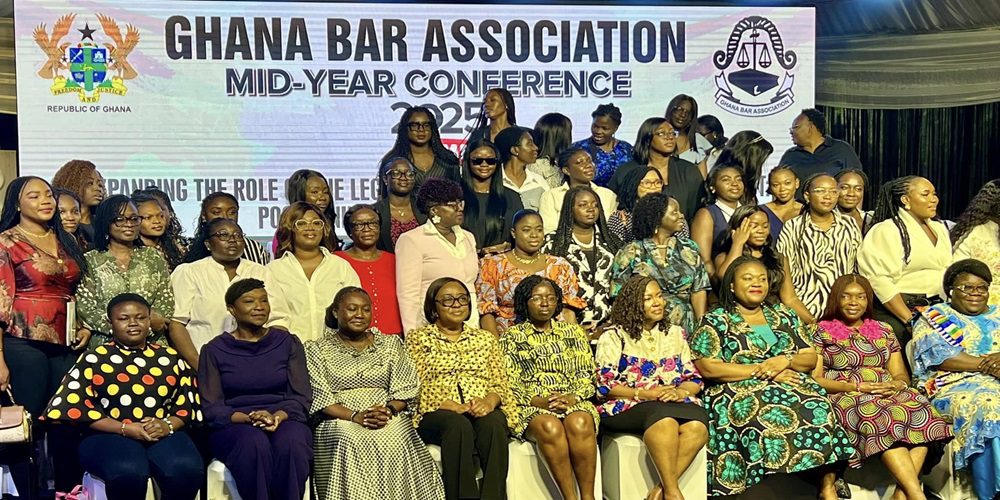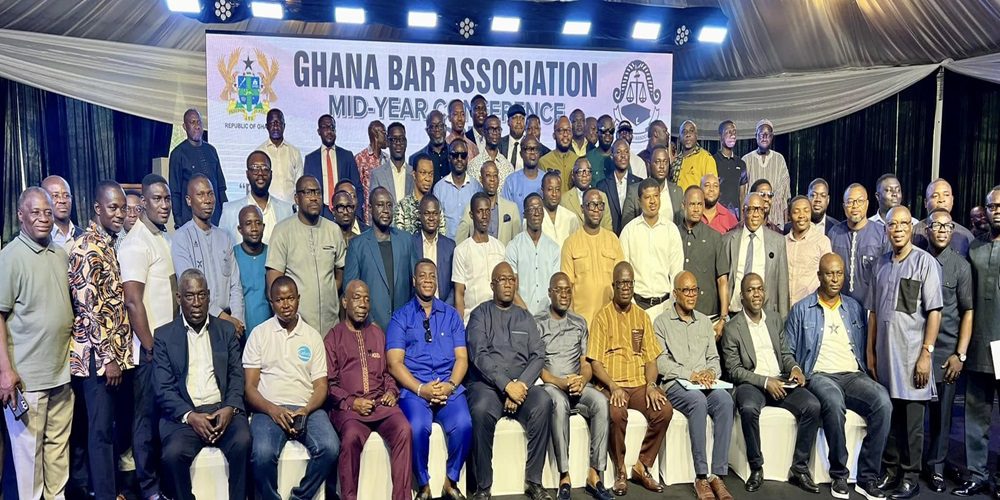The Ghana Bar Association (GBA) has passed a resolution at its Mid-Year Conference in Accra, calling on the President to revoke the suspension of the Chief Justice, Her Ladyship Justice Gertrude Sackey Torkornoo.
In a resolution passed by 43 members – a decisive majority – at its mid-year conference in Accra on Saturday-26 April), the GBA described the suspension as unfair, biased and highly prejudiced, arguing that the allegations contained in the petitions against the Chief Justice failed to establish a clear prima facie case to justify her removal.
In a spirited and highly charged gathering, the GBA also demanded the creation of a Constitutional Instrument to regulate the processes for the removal of judges under Article 146 of the 1992 Constitution.
The Association expressed concern that the current framework leaves too much room for arbitrariness and delays, potentially compromising the dignity and independence of the judiciary.
In addition, the GBA resolved to lead proposals for constitutional reforms to strengthen the procedural safeguards under Article 146.

A unanimous voice from the Bar
Members of the Association took turns during the conference to criticize the suspension of the Chief Justice, based on petitions that allegedly triggered the establishment of a prima facie case. Many described the process as troubling, raising fears about the vulnerability of judicial officers to politically motivated petitions.
Throughout the conference, speaker after speaker underscored the urgent need for clear, transparent, and expedited procedures in cases involving the removal of judges to protect the integrity of the judiciary and maintain public confidence in the justice system.
GBA president raises critical questions
In her keynote address, GBA President, Mrs. Efua Ghartey, captured the unease felt by many members of the Bar and the broader public.
“People often ask, what is the raison d’être for establishing a prima facie case?” she queried. “Are there any standards to be met to conclude that a prima facie case has been established?”
Mrs. Ghartey said following the announcement that petitions had been filed against the Chief Justice, the public repeatedly asked important questions: At what point would the country be informed of the contents of the petitions?
What happens if the petitions are found to be frivolous but the actions taken based on them have already impugned the reputation of the accused judge?
She also posed the question: “Assuming there is a hearing, how long should it last? And can the Chief Justice elect to have the proceedings heard in public rather than in camera?”
According to Mrs. Ghartey, the current situation is unprecedented in Ghana’s history, and it is imperative that the Bar remains vigilant and speaks out where necessary.
She emphasized, “It is vital that in such matters, justice is not only done but is manifestly seen to be done.”
Supreme Court’s 2020 warning ignored
The GBA President recalled that in 2020, the Supreme Court, in The Republic v. The Chief Justice and The Attorney-General, had already raised alarm bells about the absence of clear procedures.
Led by Justice Jones Victor Mawulorm Dotse, the Court urged for the formulation of rules to govern the impeachment of Article 71 officeholders.
She quoted from the judgment: “Judges must be accorded a fair measure of justice, fairness, and equity in all deliberations that affect them.”
Mrs. Ghartey insisted that four years after that landmark ruling, it was unacceptable that no rules had yet been established.
“It is about time these guidelines were produced to eliminate arbitrariness in such proceedings,” she said, adding that the hearings should be held expeditiously and, where appropriate, in open court to ensure transparency.
She reiterated the Bar’s readiness to take the lead in making proposals for the needed reforms.

How the GBA responded to the crisis
Addressing concerns raised by members over the initial GBA statement dated April 24, 2025, Mrs. Ghartey provided context on how the Association had managed the unfolding crisis.
She explained that after the Bar’s annual meeting with the Chief Justice on March 27, the Bar Council held an emergency meeting where the matter was discussed under “Any Other Business.”
At that point, the Chief Justice herself had not yet received copies of the petitions.
The Council resolved to assure the Chief Justice that the GBA would uphold its constitutional duty to support the judiciary’s independence and sought her cooperation to remain informed about developments.
The following morning, March 28 at 9:00 a.m., the Executive Council met with the Chief Justice to formally convey the sentiments of the Bar.
Soon after, news emerged that the warrant for her suspension had been delivered.
Mrs. Ghartey recounted that upon hearing this, the Executive immediately convened an emergency meeting to draft a statement.
However, as the Executive acts on behalf of the Council, it was necessary to circulate the draft among Council members for feedback.
A statement in the midst of uncertainty
The GBA President disclosed that the draft statement underwent extensive review from 2:00 p.m. until after 10:00 p.m. on March 28.
“At that time, nobody had access to the petitions or the responses,” she said. “We were working almost blind, guided only by our principles.”
It was only early the next day that information about the petitions and responses was made publicly available. Given that no official body had disputed the authenticity of the documents, the Bar treated them as credible.
At the time of drafting the statement, the GBA leadership was aware that the entire Bar was scheduled to meet on Saturday.
There were even suggestions to reference the forthcoming meeting in the statement, but due to the rapid and back-and-forth nature of the drafting process, this was ultimately left out.
A conference shaped by events
The Mid-Year Conference had been scheduled since December 2024.
It was initially intended to be preceded by the traditional Bench-Bar Faculty Lectures.
However, given the urgency and gravity of the suspension of the Chief Justice, the Association moved directly into the media conference.
“This conference has come at a fortuitous time,” Mrs. Ghartey said. “Today, we have the opportunity to speak collectively as a Bar. We must use this forum to pass a resolution that reflects our collective voice and commitment to justice and judicial independence.”
A call to action
The GBA’s resolution to call for the revocation of the Chief Justice’s suspension and to press for procedural reforms under Article 146 is not just about one case.
It signals a broader commitment to strengthening the rule of law and safeguarding the judiciary from political interference.
As Mrs. Ghartey summed it up: “The Ghana Bar Association must lead the charge for reforms. We owe it to the Constitution, the judiciary, and the people of Ghana.”
- Monday, April 28, 2025 Newspaper Headlines - 28 April 2025
- Oquaye report findings revealed - 28 April 2025
- GFA President Kurt Okraku appointed CAF’s second Veep - 28 April 2025




